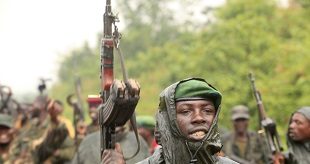Five facts about vast unruly DR Congo
The second largest country in Africa, Democratic Republic of Congo is blessed with oil, timber, diamonds and gold but cursed with violence, instability, graft and poverty.
Here are five facts about DR Congo following a key deal to defuse its latest crisis by holding elections in late 2017:
– Dynasties and dictators –
Modern-day DRC was once the personal fiefdom of Belgian King Leopold II from 1885 to 1908, when it became the colony of Belgian Congo.
Civil war broke out almost immediately after independence in 1960.
The country has been run by a string of strongmen, including General Joseph-Desire Mobutu who staged a coup in 1965, renamed the country Zaire, and set up a dictatorial kleptocracy that lasted 32 years.
In 1997 he was toppled by rebel leader Laurent Kabila, who renamed the country the Democratic Republic of Congo.
The current president is Laurent Kabila’s son Joseph, who took over after the presidential guard killed his father in 2001 — going on to win elections in October 2006 and November 2011. The latest crisis was triggered when Kabila refused to step down on December 20, his last date in office under the constitution.
The December 31 deal allows Kabila to remain in office until elections are held at the end of the year. In the 12-month interim, a transition council headed by the opposition leader will be set up and a prime minister named from opposition ranks.
– Africa’s ‘World War’ –
Congo’s two wars in the late 1990s and early 2000s dragged in at least six African armies and left more than three million dead and 1.6 million homeless, Africa’s deadliest conflict in recent history.
The country’s east has been mired for two decades in ethnically-charged violence as rebels battle for control of its rich mineral resources. Massacres involving machetes are almost monthly occurences and the attackers’ motivations are rarely clear.
The conflicts have left the country awash with weapons and men with military training, but little in the way of prospects.
– Minerals, timber and meddling –
DRC has the potential to be one of the wealthiest countries in Africa. It sits on hydrocarbons, tropical timber, gem and minerals — including a third of the world’s cobalt reserves and 10 percent of its copper — as well as elements essential for making mobile phones and other gadgets.
But competition for the wealth has bred widespread graft, smuggling and mismanagement. The watchdog group Transparency International ranked it 147th out of 168 countries in its 2015 corruption index.
Rebel militia frequently use illicit gold trading as a source of financing while President Kabila’s family have been found to personally hold more than 120 permits to dig gold, diamonds, copper, cobalt and other minerals, according to corporate documents.
During past conflicts, some foreign powers were found to be illicitly extracting the vast mineral resources, according to UN reports.
Two-thirds of the population live on less than $1.25 a day.
– Vast and diverse –
Kabila speaks English and Swahili, but has trouble with French — the country’s official language — and a poor knowledge of lingala, spoken in the capital Kinshasa.
As many as 200 vernacular languages are spoken across DR Congo meaning that a clear national identity has not materialised since independence, although support for the national football team — the Leopards — transcends linguistic and geographical barriers.
DR Congo’s scale has also presented numerous challenges to unifying and pacifying the country of almost 70 million people.
The biggest most populous central African country at 2,345,000 square kilometres (906,000 square miles), it is almost as large as western Europe.
Serious underinvestment in the road network means that many parts of the country are all but inaccessible, complicating trade and policing efforts.
River traffic picks up the slack but aviation is complicated by the fact that the country’s dismal air safety record means that several Congolese airlines are banned from landing in western countries.
– Dynamic lifestyles –
Reporting of DR Congo typically focusses on the many crises that rock the country. But Congo has a vibrant arts scene with several globally recognisable faces.
Congolese “rumba king” Papa Wemba led the Kinshasa music scene for four decades, pioneering a blend of Congolese popular music with electric rock during the 1980s.
Papa Wemba was also known as the driving spirit behind a cult movement known as the “Sape” whose members — young men called the “Sapeurs” — spend huge amounts of money on designer clothes.
Musicians Koffi Olomide and Werrason also enjoy worldwide recognition and acclaim
 The Independent Uganda: You get the Truth we Pay the Price
The Independent Uganda: You get the Truth we Pay the Price


